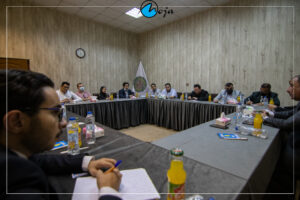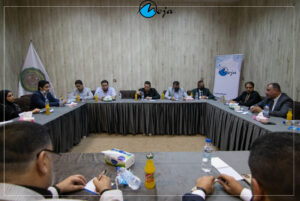12/8/2021
Moja Human Rights held a special session in which electoral expert Dr. Saad al-Abdali hosted several important guests, such as security leaders in Najaf province, and representatives of trade unions and protesters, and facilitated the media session Fadhil al-Badiri.
Dr. Saad Al-Abdali spoke about the circumstances and size of the 2021 elections, noting that these elections see a total number of 3,249 candidates, more than half less than any previous election, as the electoral process had previously had more than 8,000 candidates.
More than 24.29 million voters will also participate in the public voting window, and about 1 million will participate in the special voting window, and the special vote will include displaced persons (an estimated 120,000 voters) and security forces, excluding an overseas vote this year as a result of the massive fraud that accompanied the previous election.
Voters will be divided into some 55,000 polling stations across Iraq.
This year, the number of independent candidates has increased significantly from the rest of the electoral processes, and 63 new political parties have been established, mostly emanating from the protest movement and close to the ambitions and ideas of protesters.
The 2021 elections will not only be important for the next four years, but will determine Iraq’s political future for what comes next and for a long time, the situation in the country has reached a dead end that cannot now continue, and there are only two ways to change, either by violence or peace.
Dr. Saad al-Abdali believes that the path of violence and coups is not realistically possible in a situation like iraq, as political and social balances and the multiplicity of decision-making positions do not allow this.
Al-Abdali is likely to take the peaceful path as the possible realistic gateway to change, which, if it takes more time, is the safest and closest to application, especially since all political parties , even the strongest ones, have reached the stage of fatigue and exhaustion and have been constantly drained, so they have left ambitions to exclude others, and that large parties and political forces are ready to compromise to others and sit at the dialogue table in order to reach a compromise formula shared by all.
Al-Abdali noted that the authority will not give up its gains voluntarily, but the emergence of young people and their strength during the protests was shocking to all, and sounded the alarm in the body of the political system, and young people can invest this historic opportunity in order to achieve important gains, and force political forces to make major concessions, as they have forced them in the past and through protests to pass the new multi-constituency electoral law, and in the way of selecting the highest winner of the votes.
This exhaustion that has affected the political blocs has forced them to agree that the electoral environment will be relatively safe, and that there will be an effort to bridge the gaps between opponents of the political system and the ruling parties, and Al-Abdali believes that the future will see parties that did not usually sit together
In order to reach political agreements to calm things down, Dr. Saad al-Abdali attributes these important results to the Shiite Coordination Council, which contains large Shiite political forces.
Dr. Al-Abdali praised the efforts of the High Electoral Commission this year, as it worked to change all box storage stores from the construction of Sandwig Benel to the construction of bricks to avoid the fires that occurred in the 2018 elections, as well as the complexity of the electronic system of counting results beyond the global standards of safety.
These elections have changed with political discourse, and there is a sorting between the term “state” and “no state”, as well as the state intervened in order to impose itself as much as possible and to mention the existence of a system that holds the perpetrators accountable, as happened with the assassination of Engineer Abeer in Karbala and the attempt by the state to arrange an impact on it, Instead of being a passing criminal incident, as in previous years, Al-Kadhimi worked to go to the province himself and hold the perpetrator accountable, as did the social interaction that was taking place for the first time in Iraq, which pressured state officials to act, as the Minister of Interior, who ordered the placement of units accompanying engineer Abeer al-Prison, and municipal administrators in Najaf, Basra and Baghdad to eliminate abuses.
Public opinion has become an influential factor, pressuring the State and its officials to achieve.
There are also logistical factors that will affect the outcome of early elections, as the cancellation of the foreign elections, which witnessed significant fraud in 2018.
The special vote of displaced persons with the biometric card, and the multiplicity of UNHCR staff, backgrounds and levels will all contribute to reducing fraud.
The citizen’s mentality has also changed, and the means of influencing the election results have become futile.
Despite the new circumstances of these elections and the commission’s great efforts to ensure the integrity of the elections, there is general pessimism, and Dr. Abdali believes that such a feeling is incorrect and illogical.
He mentioned his previous personal experiences at UNHCR, stating that previously suicide bombings targeted UNHCR cadres and headquarters, there had been executions of staff, rocket and mortar bombings of polling stations, as well as collective threats by terrorist organizations that prevented citizens from working with UNHCR.
Dr. Al-Abdali mentioned a special incident in Anbar province, where al-Qaeda threatened anyone who worked in the elections, and therefore there were no voting staff, thousands of voting staff were transferred from Diwaniyah province by C130 military transport aircraft to Anbar province, and the elections were held by them.
All these factors do not exist today, and this is a positive call for active participation in the elections.
There are outstanding issues that need to be resolved, the most important of which is that although there are laws governing the work of parties, there is no application of these laws. Although the law has forced parties to open bank accounts, party spending is not done through these accounts, but through cash, which makes it difficult to monitor the sources of income of political parties.
The law also required all parties not to be associated in any way with any militia or armed faction, but there are parties that have been transformed into armed factions after the ISIS attack that have not yet been held accountable.
The fundamental problem with parties with armed ties is that they were once opposition parties accustomed to carrying weapons, and see no problem in continuing to carry them, some parties possess anti-aircraft weapons and when asked why they possess such heavy and sophisticated weapons that explain the protection of their headquarters.
Dr. Abdali believes there is much to be done to address the problems of parties and their associations with armed entities.
Nor does Iraq have a (party spending) law governing maximum electoral advertising, party finances, income positions and ways of spending their funds.
Dr. Al-Abdali talked about the withdrawals made by some blocs from the electoral process,
He noted that UNHCR had not officially received any request to withdraw, and that there were committees set up to negotiate with the withdrawals, as there was a desire for the participation of all.
If they do not participate, the democratic and political process will continue with or without them, and there is a clear government and political will to do so, Al-Abdali said.
The withdrawn forces can return to the electoral race a minute before the election, all the names of their candidates have been printed on the electoral papers, and will remain there, and the results of the votes they will receive will be announced, and if they can win a parliamentary seat, it will also be announced and they will become deputies.
Recommendations:
- Praise the role of young protesters and their efforts to pass the new multi-constituency electoral law and individual voting, and encourage them to take the political path and participate in early parliamentary elections in order to gain more.
- Note the role of the High Electoral Commission and its great efforts to make the electoral process a success and ensure its integrity.
- The Kadhimi government has a responsibility to fully implement the party law, dissolve the files of parties with armed ties, and monitor party spending, and the party law must be applied if we want more fair elections.
- There is a need to pass the (party spending) law to regulate the cap on electoral advertising.
- Call on those who withdraw from the elections to return to the electoral race in order to ensure that they are in the political process that will move forward with or without them.














